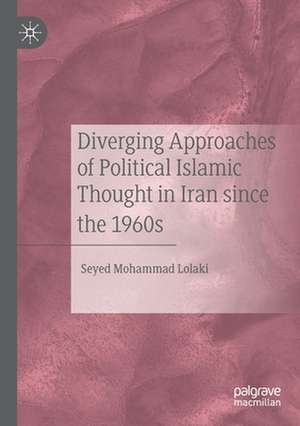Diverging Approaches of Political Islamic Thought in Iran since the 1960s
Autor Seyed Mohammad Lolakien Limba Engleză Paperback – 26 noi 2020
This book argues that Political Islam in the Iranian context evolved into three main schools of thought during the 1960s and 1970s: Jurisprudential Islam led by Ayatollah Khomeini, Leftist Islam led by Shariati, and Liberal Islam led by Bazargan. Despite the fact that all schools seek an Islamic state, their chosen methods and philosophical approaches diverge considerably. The synthesis of these three contrasting socio-political views is structured here to provide a coherent interpretation by means of ongoing comparison. This method has so far not been presented in academic studies within the field of Political Islam.
Furthermore, this book provides a critical analysis of the aforementioned ‘Political Islam’ schools in Iran, their similarities and differences, relative success or failure, their contribution to the revolution of 1979 and how they have evolved from the pre-revolution era to the present.
| Toate formatele și edițiile | Preț | Express |
|---|---|---|
| Paperback (1) | 450.33 lei 6-8 săpt. | |
| Springer Nature Singapore – 26 noi 2020 | 450.33 lei 6-8 săpt. | |
| Hardback (1) | 529.28 lei 6-8 săpt. | |
| Springer Nature Singapore – 26 noi 2019 | 529.28 lei 6-8 săpt. |
Preț: 450.33 lei
Nou
Puncte Express: 675
Preț estimativ în valută:
86.19€ • 89.74$ • 72.84£
86.19€ • 89.74$ • 72.84£
Carte tipărită la comandă
Livrare economică 10-24 martie
Preluare comenzi: 021 569.72.76
Specificații
ISBN-13: 9789811504808
ISBN-10: 9811504806
Pagini: 239
Ilustrații: XXI, 239 p.
Dimensiuni: 148 x 210 mm
Greutate: 0.32 kg
Ediția:1st ed. 2020
Editura: Springer Nature Singapore
Colecția Palgrave Macmillan
Locul publicării:Singapore, Singapore
ISBN-10: 9811504806
Pagini: 239
Ilustrații: XXI, 239 p.
Dimensiuni: 148 x 210 mm
Greutate: 0.32 kg
Ediția:1st ed. 2020
Editura: Springer Nature Singapore
Colecția Palgrave Macmillan
Locul publicării:Singapore, Singapore
Cuprins
1. The Quest for Power in Iran: Principle Questions and Methodology.- 2. Concepts & Context.- 3. Three Key Ideological Elements.- 4. The West and ‘Otherness’: The Question of Modernity.- 5. A Return to Innocence: The Resurgence of Shia Ideas.- 6. Rocking the Casbah: The Relationship between Politics and Religion.- 7. The Table Spread: The Ideals of Islamic Government.- 8. In the Beginning: Iran’s Constitutional Law after the 1979 Islamic Revolution.- 9. The Final Cut: Authority And Democracy In Contemporary Iran: From National Borders to the Ideas of Islamic Empires.- 10. Conclusion.
Notă biografică
Seyed Mohammad Lolaki is a researcher who received his PhD degree in Political Science and Public Policy from the University of Waikato in September 2017. He obtained his Master's degree in Political Science from Mofid University of Qom in Iran in 2005. His current research interests include Political and Social Islam, modernist discourse and democracy in the Middle East.
Textul de pe ultima copertă
This book argues that Political Islam in the Iranian context evolved into three main schools of thought during the 1960s and 1970s: Jurisprudential Islam led by Ayatollah Khomeini, Leftist Islam led by Shariati, and Liberal Islam led by Bazargan. Despite the fact that all schools seek an Islamic state, their chosen methods and philosophical approaches diverge considerably. The synthesis of these three contrasting socio-political views is structured here to provide a coherent interpretation by means of ongoing comparison. This method has so far not been presented in academic studies within the field of Political Islam.
Furthermore, this book provides a critical analysis of the aforementioned ‘Political Islam’ schools in Iran, their similarities and differences, relative success or failure, their contribution to the revolution of 1979 and how they have evolved from the pre-revolution era to the present.
Seyed Mohammad Lolaki is a researcher who received his PhD degree in Political Science and Public Policy from the University of Waikato, New Zealand, in September 2017. He obtained his Master's degree in Political Science from Mofid University of Qom in Iran in 2005. His current research interests include Political and Social Islam, modernist discourse and democracy in the Middle East.
Caracteristici
Provides insights into a cultural and political history of Iran Explores the degree of relevance of the three narratives that led to the 1979 revolution Includes comparative analysis of three schools of thoughts led by Khomeini, Shariati, & Bazargan
